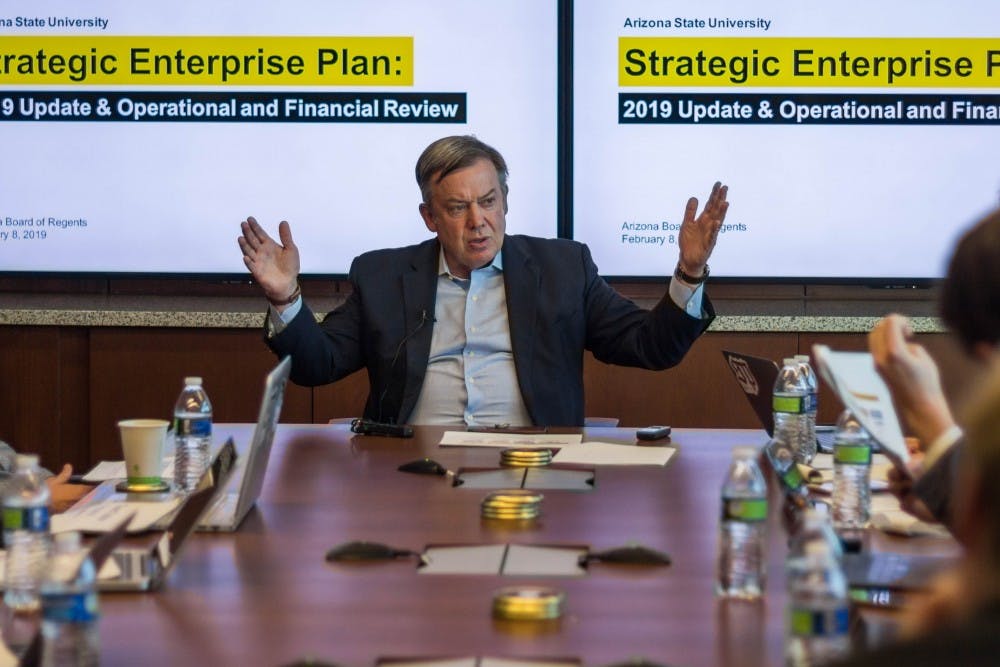ASU is looking to expand its partnerships in the private sector with a forthcoming for-profit venture, as first reported by The Chronicle of Higher Education and confirmed by the University.
Katie Paquet, a spokesperson for the University, said the company would act as an intermediary to connect ASU with corporations, then creating and maintaining the partnerships.
While ASU is the leading educational institution in the development stages of the venture, Paquet said other universities will eventually be able to seek corporate partnerships through the venture as well.
“Our mission is to scale access to education locally, nationally and globally through increasing our partnerships with corporations,” she said.
She said the partnerships with Starbucks and Uber already play an important role in advancing this mission – more than 18,100 Starbucks partners having enrolled at ASU through the Starbucks College Achievement Plan since the program was launched in June 2014 and 3,000 students have graduated as of December 2018.
Seeking, establishing and maintaining these partnerships with corporations come at a cost and demand infrastructure that puts strain on the University to maintain. In creating an intermediary company, the work and associated costs are diverted away from the University, but the impact and financial gains from the partnerships are upheld.
The effort is aimed at being a cost-saving venture for the University, and it will not require a major investment.
High-return impact investment
The so-far unnamed venture will be financed and majority owned by the TPG Rise Fund, which is a $2 billion impact investment fund.
Bill McGlashan, the founder and former CEO of the fund and TPG Growth, was fired from the firm after being indicted in the U.S. college admissions scandal that made headlines last week. Paquet said McGlashan had no involvement in the development of this venture.
“The mission of the Rise Fund is to support those ventures in which the opportunity to drive social impact at scale is inherent in the model,” Steve Ellis, a managing partner for the Rise Fund, said in an email statement.
John Rogers, the Rise Fund’s education sector lead, said "within the education sector, we have particularly looked for opportunities to strengthen the path from education to employment."
While nearly 90 percent of the U.S. population graduated from high school in 2018, according to data from Statista, only 35 percent went on to attain a college degree. Expanding educational opportunities to the adult market is one of the main motivators for this type of partnership, Paquet said.
As more partnerships are formed and students are enrolled, revenue in the form of tuition is generated for the University.
In exchange for the service of creating and maintaining these partnerships, the TPG Rise Fund will receive fees from ASU and any other institutions involved. The fees will be calculated based on percentage of enrollment and pre-determined fixed fees. The corporation involved in the partnership also pays into the service in the form of tuition assistance for every student.
Guardrail to consumer protection
Educational institutions venturing into for-profit business can be controversial. Robert Shireman, director of higher education excellence and senior fellow at The Century Foundation, said his extensive work identifying the history of repeated abuses by for-profit colleges demand pause for any for-profit venture in education.
“For-profit companies are great at creating lattes, cars, phones and lots of other things, but their track record in education is not great,” Shireman said.
With revenue as a priority and quality education difficult to define, many for-profit colleges and educational partnerships leave their students burdened by debt without much to show for it, he said.
However, Shireman said for-profit endeavors where employers are the customer are generally less risky for the student.
“Employers are paying close attention to the value for the price and have the expertise to do that,” Shireman said. “If employers consider the degree to be worth the price, then that’s a good validator.”
The employers are in a strong position to monitor, which demands a higher level of accountability from the educational provider.
“This structure tends to drive the school to be more attentive to the needs of the workforce, rather than focusing on recruiting students, getting them in the door, having them take on a load of debt, then spending very little on actually educating them, which is the case in a lot of for-profit education,” Shireman said.
A social and economic imperative
Paquet said the University and TPG are confident that corporations will be interested in striking up partnerships with the University.
“We know there is a large segment of the population that is not the traditional university age and doesn’t have access to higher education, but who are very interested in pursuing a degree to advance their careers and themselves,” she said. “And lots of employers are interested in offering their employees these opportunities.”
She said serving this sector of the workforce and continuing to scale access to these partnerships is the primary motivation.
“We think it is an economic and social imperative to provide these opportunities to students and their employers,” Paquet said.
Update: This story was updated at 7:40 p.m. on March 22, 2018 to clarify the University did not interact with Bill McGlashen in the development of the venture.
Reach the reporters at goldham@asu.edu and follow @graceoldham123 on Twitter.
Like The State Press on Facebook and follow @statepress on Twitter.
Continue supporting student journalism and
donate to The State Press today.




